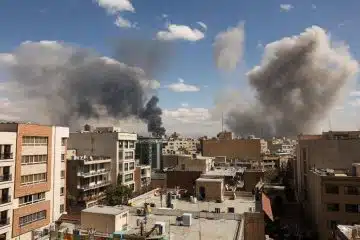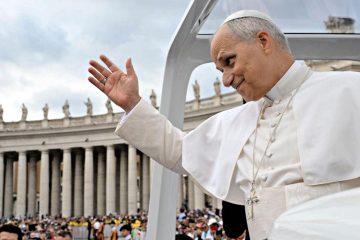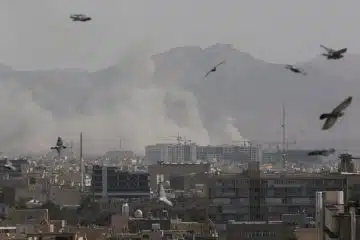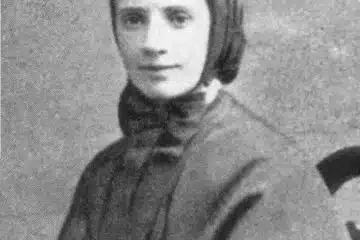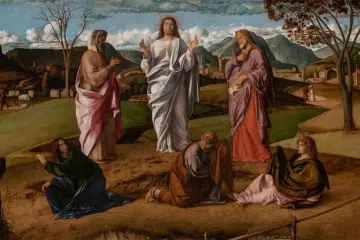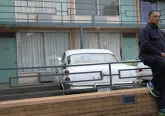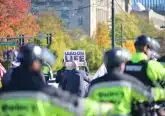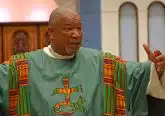Catholic law school offers free help to arrested protesters
by Anna Wilgenbusch
St. Paul, Minn., Jun 6, 2020 / 06:01 am MT (CNA).- Since Friday, there have been 612 arrests in the Twin Cities metroplex associated with protests following the killing of George Floyd, according to the Minnesota Department of Public Safety.
In response to the arrests, the University of St. Thomas School of Law in St. Paul, Minnesota, announced that it would defend those arrested for non-felony offenses associated with the protests free of charge. The school ranks second in the nation for practical training, according to a 2020 ranking by the National Jurist.
Defending the marginalized of society, who otherwise would not be able to afford representation, has been a long-standing goal of the Criminal and Juvenile Defense Clinic at the University of St. Thomas School of Law, which is taking on the cases associated with the protests.
The center will defend anyone charged with “gross misdemeanors, misdemeanors, petty offenses, delinquency offenses” that are associated with the protests, such as curfew violation. The center will not defend those charged with burglary and arson, which accounted for some of the arrests accompanying the protests.
“There have been a lot of cases coming in regarding violations of the curfew and other peaceful violations,” said University of St. Thomas School of Law Dean Robert Vischer. “That’s been the focus, rather than destruction of property.”
While the charges these defendants face are petty, if a defendant does not pay the fees associated with their arrest, their charges can quickly accumulate.
“There are huge collateral consequences for a juvenile who gets a misdemeanor charge or even an adult who gets a misdemeanor charge,” said Leyla Bari, a 2020 graduate from St. Thomas School of Law and an alumna of the clinic.
“The way that Minnesota law is written means [that] your driver’s license will get suspended, and then often people will still have to drive to work… and when your license gets suspended, that results in more fees, and often people will have to drive out of necessity, and it just creates a whole cycle of debt that it makes really difficult to get out of,” Bari said. “So it’s a small, little, tiny charge that just snowballs.”
Sarah Koziol, a rising third year law student who has been responding to calls made to the clinic, said that these kinds of cycles “plague poor people.”
“These types of fines create a pathway for criminalizing people who weren’t even found guilty in the first place,” Koziol said.
“It is critical to perpetuating the mission of St. Thomas [and] perpetuating Catholic social teaching pillars in the community in a very tangible, real way, to make sure we stand up for each protestor, each indigent person who is down there fighting for their rights, to make sure these small, little minute charges do not snowball and ruin their life,” Bari said.
Although the commitment to serving the under-represented is part of the center’s mission, this particular initiative arose in immediate response to community need and will require the volunteer work of a team of 13 law students over the summer, during a time when the center does not usually accept new cases.
“We were not planning on this being our summer, but who was?” said Rachel Moran, who founded and directs the Criminal and Juvenile Defense Clinic. “It was just a very organic response to community need.”
On the second night of protests following the death of George Floyd, Moran received a message from Bari asking if the clinic would be able to provide representation for protesters who were being arrested.
“I saw protesters out on the streets very early on, and I was very distraught at seeing so many young black and brown youth who were the first on the front lines to be picked out by officers, being intimidated by officers, getting arrested, getting maced, and sprayed with tear gas, and I wanted to do something, so I reached out to Professor Moran,” said Bari.
“I said yes,” said Moran. “We are a clinic that prioritizes being responsive to community need.”
Vischer said that the response of the community has been “largely enthusiastic.”
“Of course, whenever you’re delving into the representation of participants in controversial social actions, it won’t be uniformly enthusiastic,” he said. “But that’s part of being a criminal defense attorney; you are representing those who may not otherwise have a voice, and you may not be embraced by the larger community.”
The calls of complaints he has received from the public have expressed concern that the center is “supporting the protesters,” Vischer said.
“I point out that representing someone who is accused of a crime is separate from whether you support the underlying action that they have been arrested for,” said Vischer. “Ensuring that someone has representation doesn’t mean that the person will escape all punishment for violating the law.”
“Defense attorneys broadly have to represent everyone,” said Bari. “That is our duty as attorneys. We have to represent people, we have to give people a fair shot at justice in our justice system.”
Koziol said that the voices that criticize the clinic often point to the destruction that ensued with protests, often saying, “look at the destruction of Minneapolis and other cities, you are supposed to be taking care of creation, not destroying it,” Koziol reported.
Bari challenged that assertion, saying that “by amplifying and standing up for communities who have traditionally been pushed down and silenced, we’re helping to not just keep our gardens and yards looking nice, we’re helping to actually deliver true justice, which is the fulcrum that any kind of creation needs to be premised on.”
“The protests are legitimate and the tactics that have turned violent were turned violent by police,” said Koziol. “When protestors can speak up, they can create meaningful change.”
As a former public defendant in Chicago, Moran said that she is accustomed to being criticized for her work.
“I’d like to have a longer conversation with them,” said Moran. “We have a duty to advocate for the marginalized and we have a duty to stand up for those who have been wronged, particularly when they have been wronged by an abusive authority. That should be very consistent with Catholicism.”
The center believes that in defending the protesters it is living its Catholic identity.
“I think a Catholic law school should be instrumental in helping provide a voice for the voiceless and that the views of those on the margins of society are heard, and I think that a criminal defense clinic, generally, is aligned well with that mission, and that includes protesters who are arrested for protests,” Vischer said.
“By protecting freedom of speech and expression, that doesn’t just help one person, it helps all of us, which is directly tied to our mission, which is ‘for the common good,’” said Bari, quoting the University of St. Thomas motto. “It’s not isolated as one incident.”
“It is deeply Catholic to affirm the dignity of every person, and that’s really the starting point for what we’re doing here,” said Moran. “We are affirming the dignity of George Floyd. After the police denied that dignity and treated him as if he had no value, we are affirming that his life mattered.”



